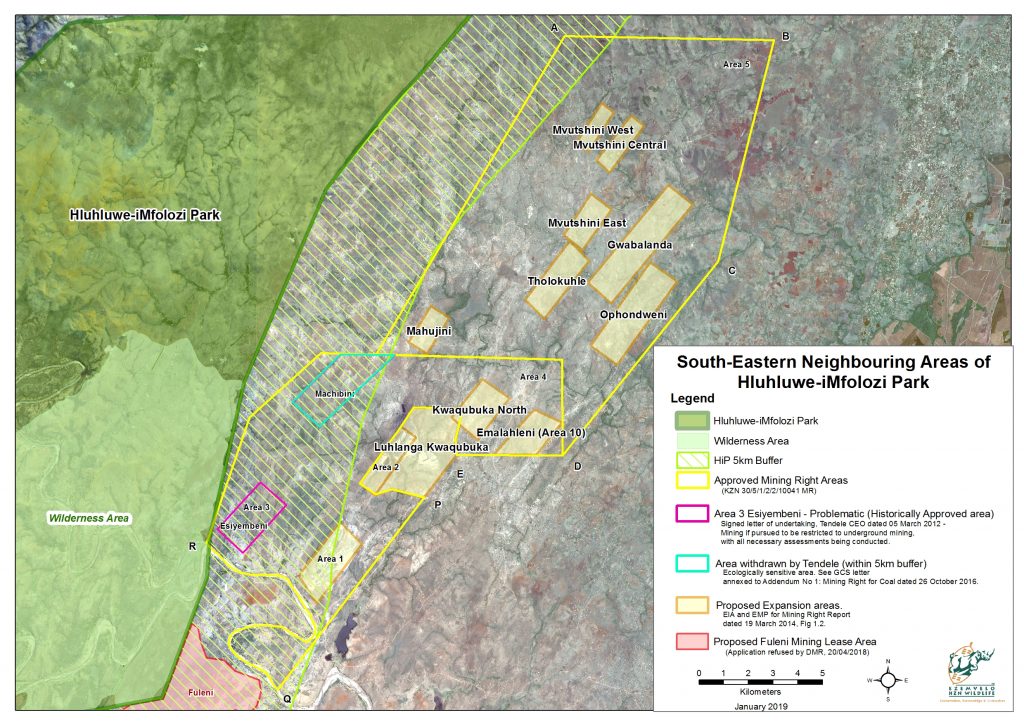Tholakele Mthethwa is one of 19 families resisting relocation to make way for the expanded coal mining operations on the border of Africa’s oldest game reserves, the Hluhluwe-iMfolozi Game Park.
In April this year her home was raked by gunfire.
In a subsequent affidavit opposing an urgent application by Tendele Coal mining for the courts to intervene and determine fair compensation to families to make way for mining, Mthethwa provides insight into how African communities security of land tenure, has, since colonial times, remained precarious and insecure.
In her affidavit opposing relocation, Mthethwa states: “I was born on top of a seam of coal of the hardest and most compact quality: anthracite,” states Thokalele Mthethwa.
“Tendele asked the Department of Mineral Resources and Energy (DMRE) for a right to scoop that coal out from under me and to sell it for profit. They never asked me or my neighbours for permission to do so as required by law. They did not even bother to attempt to reach agreement with me on the terms on which they would move me, my family, my ancestors, or any of my neighbours from our ancestral land. Despite this, the DMRE gave them a mining right covering over 200 square kilometres. This was unlawful. Blatantly.”
There are numerous flaws in the manner in which Tendele made offers to residents it wants to relocate, said Mthethwa. “Tendele’s papers assert that we do not own our land, and that it is owned by the Ingonyama Trust. This is not true, and is subject of legal argument.”|
“While I have no formal qualifications to speak to the details of Zulu customary law, I confirm that I have lived under and practiced customary law my entire life. What I can speak to is how our family obtained our land rights and the nature of these rights as they are practiced.
My family has resided at Ophondweni since my grandfather moved to this area. He moved here from Emzinyathi after visiting his brother-in-law and falling in love with the area.
After the community approved of the land my grandfather requested, a ceremony was held on the site where the land was being allocated with the iNkosi, whose name I cannot remember, and Induna Felesinyameni Mkhwanazi.
My grandfather had to provide a bottle of vodka, a case of beer, and large amounts of traditional beer. Most of the alcohol provided was consumed by his new neighbours. The bottle of vodka was kept by the Induna. With some minor changes here and there, this is still how land allocation is still done in our community.
When my grandfather passed away, my grandmother built a home about a kilometre away. The same process was followed for the land allocation. I was about 18 at this time and remember it well. By virtue of having been allocated this homestead, my family is entitled to graze livestock in the area provided they do not enter other people’s homesteads or fields.
We have a home garden about the size of a football pitch where I grow spinach, carrots, sweet potato, pumpkin, and cabbage for home consumption. I collect my firewood from around the house and also collect wild guavas in the area.
We also have a ploughing field about the size of two football pitches. We were allocated the rights to the garden and to the ploughing field at the same time as the land was allocated. We have exclusive rights to use this land, as well as the plot where our home is. My son, Thabani, is unemployed, but I hope that when he is able to get a job he can get married. When this happens, he will be allocated the ploughing field for him and his wife to develop their own homestead and garden.
When I pass away, my brother will continue to have rights over the land. When we both pass away, the land will pass to my children. I am not aware of any circumstances under which land rights can be taken away without the consent of the land rights holder under our customary law except where they have engaged in “witchcraft”. I am not aware of this ever happening in our area in my lifetime, or even before.”
Mthethwa is a representative of the Mfolozi Community Enviromental Justice Organisation (MCEJO) which has applied to the courts to review the awarding of mining rights awards to Tendele in 2016. This mining licence covers 220 square kilometres on the south-eastern border of the Hhluhluwe-Imfolozi Game Park.


